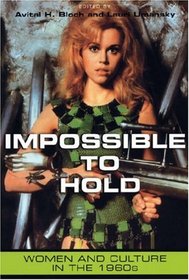Search -
Impossible to Hold: Women and Culture in the 1960s (American History and Culture Series)
Impossible to Hold Women and Culture in the 1960s - American History and Culture Series
Author:
"A superb accomplishment that assembles lively, spirited writing about women, some well-known and others less so, who made a difference in the way we live our lives today." — ?The Journal of American History "For too long, cultural historians of the Sixties have marginalized women, and women?s historians of that period have privileged the ... more »
Author:
"A superb accomplishment that assembles lively, spirited writing about women, some well-known and others less so, who made a difference in the way we live our lives today." — ?The Journal of American History "For too long, cultural historians of the Sixties have marginalized women, and women?s historians of that period have privileged the ... more »
ISBN-13: 9780814799109
ISBN-10: 0814799108
Publication Date: 2/1/2005
Pages: 368
Rating: ?
ISBN-10: 0814799108
Publication Date: 2/1/2005
Pages: 368
Rating: ?
0 stars, based on 0 rating
Publisher: NYU Press
Book Type: Paperback
Other Versions: Hardcover
Members Wishing: 1
Reviews: Amazon | Write a Review
Book Type: Paperback
Other Versions: Hardcover
Members Wishing: 1
Reviews: Amazon | Write a Review
Genres:
- Biographies & Memoirs >> Specific Groups >> Women
- History >> Americas >> United States >> 20th Century >> 1960s
- History >> Historical Study & Educational Resources >> Social History
- History >> World >> 20th Century
- History >> World >> General
- Nonfiction >> Social Sciences >> Popular Culture
- Nonfiction >> Social Sciences >> General
- Nonfiction >> Women's Studies >> General
- Nonfiction >> Women's Studies >> History




